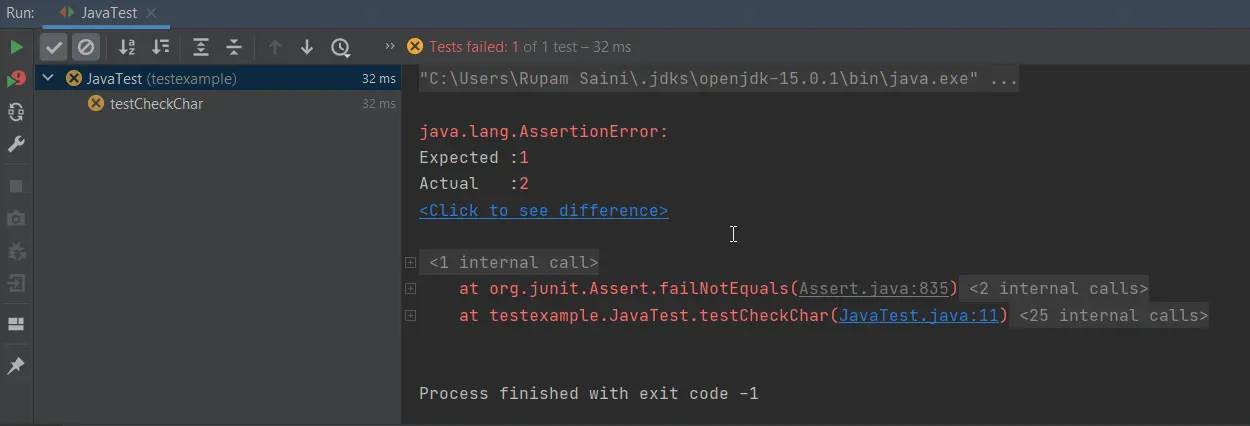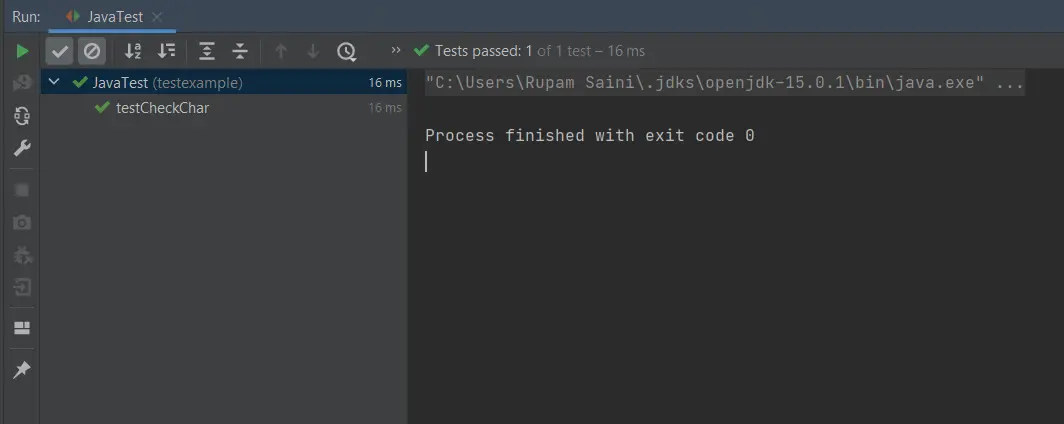Java 中的单元测试

本文将讨论 Java 中的单元测试。有几种类型的测试,单元测试就是其中之一。
单元测试涉及对隔离组件(如类和方法)的测试。这是有效的,因为我们可以很好地控制整个程序的特定部分。
在 Java 中使用 JUnit 测试框架进行单元测试
下面的例子有一个简单的程序,它使用 calculateOccurrences() 方法返回字符串中指定字符的出现总数。
calculateOccurrences() 方法接收两个参数:stringToUse,第二个参数是 characterToFind。
在函数中,我们遍历字符串并检查字符串中是否有任何字符与 characterToFind 匹配,如果匹配,则增加 charCount。我们使用适当的参数调用 main() 函数。
我们需要对其进行测试才能知道它是否正常工作;我们将在本教程的下一部分执行此操作。
public class JavaTestExample {
public static void main(String[] args) {
int getTotalOccurrences = calculateOccurrences("pepper", 'p');
System.out.println(getTotalOccurrences);
}
public static int calculateOccurrences(String stringToUse, char characterToFind) {
int charCount = 0;
for (int i = 0; i < stringToUse.length(); i++) {
if (stringToUse.charAt(i) == characterToFind) {
charCount++;
}
}
return charCount;
}
}
输出:
3
为了对 Java 程序进行单元测试,我们使用了专门为 Java 中的单元测试而设计的 JUnit 测试框架。我们使用以下 maven 依赖项导入它。
<dependency>
<groupId>junit</groupId>
<artifactId>junit</artifactId>
<version>4.13.2</version>
</dependency>
为了测试不同的场景,我们创建测试用例,然后检查测试是否通过给定条件。
对于此示例,我们使用可从 https://www.jetbrains.com/idea/ 下载的 Intellij IDEA IDE。
我们将主要的 Java 和测试文件保存在同一个包中,以防止任何访问错误。
下面是第一个测试用例;我们用 @Test 注释该方法以使其成为测试用例。JUnit 为我们提供了几种断言方法来帮助我们编写测试。
为了测试返回值是否等于我们的期望,我们使用 assertEquals() 方法。
我们在这个程序中使用的 assertEquals() 方法有两个参数;第一个是我们通过 1 的预期结果。
第二个参数是 calculateOccurrences() 方法在传递 this is an java example 字符串和 i 作为要查找的字符时的实际返回值。
我们运行测试,IDE 中会弹出 Run 窗口。请注意,输出中的窗口标题显示测试失败:1 次测试中的 1 次。
此外,我们得到带有 AssertionError 的消息,预期值为 1,实际值为 2。
测试失败是因为我们预期结果为 1,即 this is a java example 字符串中 i 的数量,但实际上,其中 i 出现了两次,因此测试失败。
测试用例 1:
import static org.junit.Assert.assertEquals;
import org.junit.Test;
public class JavaTest {
@Test
public void testCheckChar() {
assertEquals(1, JavaTestExample.calculateOccurrences("this is a java example", 'i'));
}
}
输出:

在第二个测试用例中,我们使用 2 作为具有相同字符串的预期结果,在输出中,我们得到一个绿色的勾号,带有消息 Test Passed:1 of 1 test。这是因为预期值等于实际值。
测试用例 2:
import static org.junit.Assert.assertEquals;
import org.junit.Test;
public class JavaTest {
@Test
public void testCheckChar() {
assertEquals(2, JavaTestExample.calculateOccurrences("this is an java example", 'i'));
}
}
输出:

Rupam Saini is an android developer, who also works sometimes as a web developer., He likes to read books and write about various things.
LinkedIn